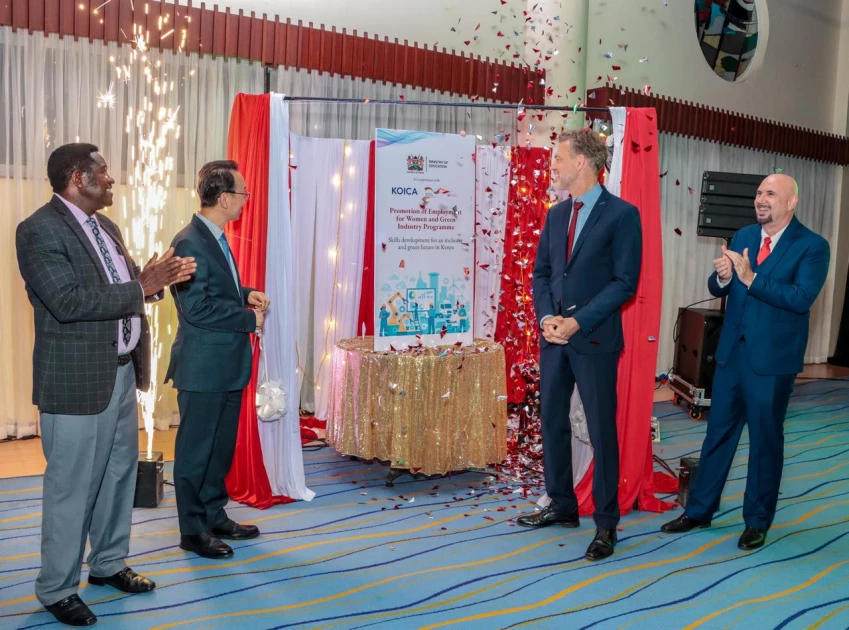New TVET initiative to champion skills for women, advance Kenya’s green economy

From left to right: Dr Lawrence Guantai (State Department for TVET), H.E. Kang Hyung-Shik (Korean Ambassador to Kenya), H.E. Alexander Fierley (Deputy Head of Mission, Embassy of Germany), and Horst Bauernfeind (GIZ TVET Programme Manager) at the official launch of the new TVET initiative.

Audio By Vocalize
A new Technical and Vocational Education and Training (TVET)
initiative has been launched to empower women and advance Kenya’s transition to
a green, sustainable economy.
The ‘Promotion of
Employment for Women and Green Industry’ project is jointly financed by Germany
and South Korea, through the Korea International Cooperation Agency (KOICA),
and implemented in close collaboration with Kenya’s Ministry of Education,
State Department for TVET.
The initiative aims to equip young women with
market-relevant skills for the green and industrial sectors, while promoting
gender inclusion and environmental sustainability in Kenya’s rapidly evolving
labour market.
It will directly benefit 3,000 young people, particularly
women, while empowering industries to access a skilled workforce trained in
sustainable manufacturing and green technologies.
Key interventions include strengthening the Ministry of
Education’s capacity, greening TVET curricula, partnering with industry
associations, and expanding career guidance for women in Science, Technology,
Engineering, and Mathematics (STEM).
Building on the foundations of earlier TVET programmes, the
Women and Green Industry Project will focus on four key areas. It will develop
market-driven green TVET programmes across five priority sectors, ensuring
training remains relevant to evolving industry needs.
The project will expand work-based learning (Dual TVET)
through a gender-sensitive approach, giving women hands-on experience and
exposure to real workplaces. It will also strengthen institutional capacity to
design and deliver green and gender-responsive training, equipping TVET
institutions to lead the sustainability agenda. Finally, the project will
promote gender inclusion in green manufacturing and related industries by
mainstreaming gender policies within training institutions and industry
partnerships.
As Kenya advances its Vision 2030 and climate-resilient
development agenda, the demand for green skills has never been greater. Women,
however, remain underrepresented in technical and industrial careers. This new
initiative seeks to close that gap by preparing women for opportunities in
energy, green manufacturing, construction, transport, and hospitality — sectors
driving Kenya’s green transition.
The project is anchored on the successful Promotion of Youth
Employment and Vocational Training Project, which is jointly financed by the
Ministry for Foreign Affairs of Finland and the German Federal Ministry for
Economic Cooperation and Development (BMZ).
By combining gender equality, sustainability, and
innovation, the project aligns with global goals on SDG 5 (Gender Equality) and
SDG 8 (Decent Work and Economic Growth), while reinforcing Kenya’s commitment
to inclusive and future-oriented skills development.
Speaking at the official unveiling, Dr. Esther Muoria,
Principal Secretary, State Department for TVET welcomed the collaboration
noting, “This partnership reinforces Kenya’s vision of building a modern,
inclusive, and future-ready TVET system. By equipping women with green skills,
we are not only enhanc ng employability but also advancing sustainability as a
central pillar of our education reforms. Empowering women through technical
training means empowering communities, industries, and the nation’s transition
to a greener, more resilient economy.”
On his part, Kang Hyung-Shik, Ambassador of the Republic of
Korea to Kenya, affirmed South Korea’s support to Kenya’s TVET adding, “This
partnership reflects South Korea’s dedication to supporting inclusive growth
and innovation. Investing in women’s technical skills is one of the most
powerful ways to transform communities, strengthen industries, and drive
sustainable development.”
Alexander Fierley, Deputy Head of Mission, Embassy of Germany
in Kenya, reiterated Germany’s support towards TVET reforms in Kenya noting,
“Germany remains committed to partnerships that equip young people, especially
women, with the skills needed for the green and digital transitions. Together,
we are shaping a TVET system that responds to industry needs while building a
sustainable future.”
The Employment Promotion for Women and Green Industry
Project represents a major step towards inclusive industrial transformation. By
promoting gender equality in TVET and industry, the project will help build a
skilled workforce ready to drive Kenya’s green growth agenda, create decent
jobs, and enhance economic resilience.
As the world shifts toward low-carbon economies, this
initiative reaffirms Kenya’s green, inclusive future, powered by women.


Leave a Comment